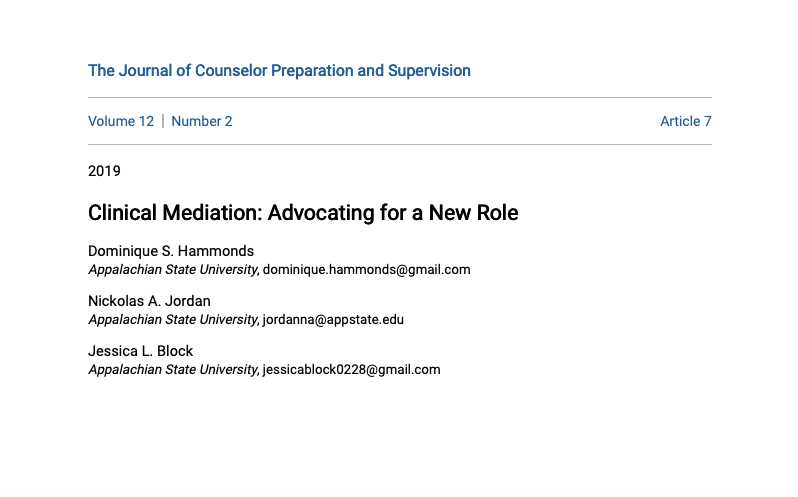Integrating Schools of Thought – VirNet Mediation
Academic Mediation Research Review
Clinical Mediation and Counselor Education
Conflict resolution, mediation and counseling go hand-in-hand; college and university counseling programs can further integrate the mutually beneficial skills of counseling practice and various forms of dispute resolution, including mediation.
In their 2019 article, “Clinical Mediation: Advocating for a New Role,” Appalachian State University authors Dominique S. Hammonds, Nickolas A. Jordan, and Jessica L. Block argue that counselor training programs often fail to provide adequate training for mediation and counseling. This is especially true when evaluating, understanding, and dealing with emotions shaping conflict and those that prevent mutual goal attainment. The authors contend that mediation and counseling should be co-taught, in order to enhance both practices.
Mediation and Counseling: The State of Education
Despite the obvious connections between mediation and counseling, practitioners who offer both services are exceptions to the rule. As the authors point out, though, counselors are uniquely positioned with their skills and training to provide effective mediation, due to their “counseling skills and increased emotional intelligence.” n.p.
The intersection of mediation, education, and counseling practice is one that has not been fully explored in counselor education programs, but it is an area that warrants further development and exploration by practitioners and educators alike.
The Relationship Between Mediation and Counseling
Defining Mediation
As a form of dispute resolution, mediation is less formal than the process of arbitration (often used in lieu of litigation in the courts), but more structured than informal methods of resolving family, employment, community, or other types of disputes. Mediation involves a neutral third-party mediator who facilitates discussions and negotiations used to resolve any number of disputes.
The ultimate goal of mediation is a mutually beneficial resolution of disputes and mutual goal attainment. Unlike the adversarial court process, mediation offers parties a chance to discuss and choose their own outcomes, rather than deferring those decisions to an arbiter, judge, or other third party. Finally, unlike other forms of Alternate Dispute Resolution (ADR) like arbitration, mediation offers a neutral third-party mediator who has no stake in the outcome and final resolution, though certain ethical considerations apply to the process of mediation.
Many mediators are practicing attorneys, though their training in legal systems and adversarial processes contrasts strongly with counseling education and specialty areas in counseling such as addictions, clinical mental health, rehabilitation, marriage/couple/family, and others. Counselors and other non-attorney practitioners are uniquely suited to provide an alternative perspective and approach in mediation.
The Benefits of Mediation
Mediation offers a number of benefit to parties engaged in this form of alternate dispute resolution, including each of the following:
- Clearly and directly addressing misconceptions and misunderstandings;
- Seeking resolution of conflict, including mutual goal attainment;
- Diffusing emotional conflict and equipping the parties with dispute resolution tools and practices; and
- Conserving resources (financial, time-related, emotional, and other resources) that would otherwise result in lengthy, costly court battles, emotional distress, and other negative outcomes.
Emotional Intelligence, Mediation and Counseling
The authors contend that the extensive training counselors receive in Mayer, Caruso, and Salovey’s four branch model of emotional intelligence prepares them to assist clients in (a) understanding emotional and psychological needs in order to (b) reach shared goals. This is the goal of mediation: individual and mutual understanding that leads to resolution of conflict and mutual goal attainment.
Emotional intelligence, defined originally by Salovey and Mayer, conceptualizes the way individuals problem-solve and understand the world around them (one’s “ways of knowing”). The four branch model recognizes an individuals’
- perception of emotions;
- use of emotions to facilitate thought;
- understand emotions; and
- manage one’s own emotions and those of others.
The authors note the progressive, developmental nature of this model. At the same time, less is known about the abilities and mental states that support emotional intelligence.
Nevertheless, perceiving emotions through vocalizations, expressions, behavior, and forms of communication reflects one’s perception of emotions. Similarly, relating emotionally to the experiences of others reflects the ability to understand emotions, and understanding the meaning, context, and impact of emotions represents the use of emotions to facilitate thought. Finally, evaluating and managing strategies to handle emotional responses (by one’s self and others) demonstrates an ability to manage emotions effectively.
The Takeaway: Mediation, Academic Counseling Programs, and Counseling Practice Go Hand-in-Hand
Ultimately, the goals of mediation, counselor education, and the practice of counseling align well, and skilled counselors should deepen their knowledge and skill in dispute resolution practices and methods, including mediation. The symbiosis between mediation and counseling should translate into intentional curricular shifts that require dispute resolution practices and methods in counselor education. Practitioners, likewise, should explore mediation and the possibility of integrating mediation into their own practices, either directly or through professional partnerships that facilitate dispute resolution outside of therapy. Clients benefit from a counselor’s added skills in mediation and alternate dispute resolution, and mediation can support therapeutic work when legal or other issues outside of counseling can be addressed systematically and intentionally through mediation.
Citation
Hammonds, D. S., Jordan, N. A., & Block, J. L. (2019). Clinical Mediation: Advocating for a New Role. Journal of Counselor Preparation and Supervision, 12(2). Retrieved from https://digitalcommons.sacredheart.edu/jcps/vol12/iss2/7
Explore Mediation
Schedule a Call with Dr. Earwicker Today!
Learn More
Academic Mediation Research Review
Integrating Schools of Thought – VirNet Mediation

